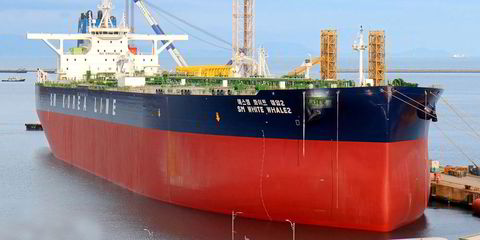The Covid-19 pandemic has affected all logistics sectors: land, sea and air. The Indonesian logistics sector grew only 1.29% year on year during the first quarter of 2020.
During the second quarter, after the pandemic hit, it dropped by 30.8% year on year, and fell by 16.7% year on year during the third quarter.
After a year like no other, TradeWinds asked 40 shipping industry stakeholders what they see for 2021 after a year beset by the coronavirus, and how the pandemic will shape shipping's future.
This has impacted not only the logistic upstream activities but also the downstream side of the business. Most of shipping's sectors have been affected negatively.
The Andhika Group, which currently focuses its operations on the domestic oil tanker and bulker business, is facing a similar situation.
On the tanker side, the pandemic has had a terrible impact. Fuel oil trade volumes fell by around 30% to 50% since demand for fuel oil evaporated, hence our tankers lost their cargoes. Our charterers have also asked for us to share their pain through contract renegotiations.
The bulker sector is also experiencing the same situation. The volume of coal carried has decreased dramatically due to lower electricity demand. At the beginning of the year, we managed to add new tonnage to our fleet based on our pre-pandemic plan and now the utilisation rate of our fleet is far from ideal.
Not many strategic possibilities are feasible during this pandemic. Shifting to another shipping sector would not be a good alternative since all are experiencing the same unfavourable conditions.
Moreover, the “new normal” procedures that need to be implemented in the shipping industry have increased our operating costs. We have had to implement new procedures for the handling of crew to prevent the transmission of the virus.
The way forward for us is to focus on optimising our efficiency and reducing costs by as much as we can. We need to concentrate on our core shipping operation and outsource several supporting activities. Those are the only options possible right now.
Luckily, we embraced digitalisation for all activities long before the pandemic happened. We applied online systems on operations, cargo and bunker monitoring, and even a technical home-doctor service.
All of these digital developments will support the shipping industry during this tough period, which requires us to comply to health protocols, promote physical distancing and prevent individual contact.
The future post-pandemic era will change shipping's investment pattern. Investment in sectors that experienced the worst impact, such as offshore, will be less favourable.
However, on the other side of the coin, a manufacturing industry recovery would also lead to a recovery of demand for the transportation of raw materials by sea.





